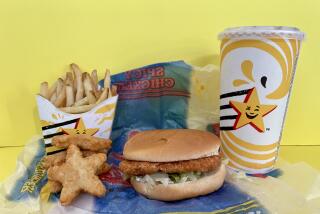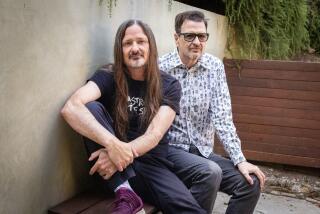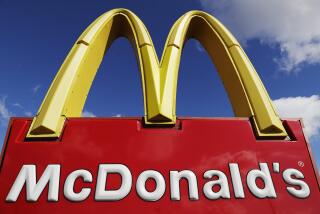My Big Mac Is Back; Praise Be to Ray Kroc : Economics: So what if McDonald’s is a crass, arrogant corporate giant. It does what it does just right.
- Share via
I am thrilled. The McDonald’s located a block from my office has reopened. Ever since it closed two years ago when the building was torn down, I have suffered cruelly. Now I can get my Big Mac and fries again. My writing has definitely improved.
Celebrating a company for its own sake is a journalistic no-no: a bit of crass commercialism that’s professionally uncool. I don’t care. McDonald’s is no ordinary company. It’s the greatest restaurant chain in history. A recent survey of the country’s best-known brands put McDonald’s in the top five (Coca-Cola was No. 1). There are three types of Americans. First are those who, like me, openly worship McDonald’s. Next is a much larger group that likes McDonald’s but would never admit it. These people use their children as an excuse to go--or only visit a McDonald’s where they won’t be recognized by family and friends. Finally, there’s a small group of weirdos who can’t stand the food and regard McDonald’s as the embodiment of all that is vulgar in American mass culture.
Before Ray Kroc--the man who made the chain what it is today--there were Richard and Maurice McDonald. The brothers McDonald conceived the golden arches and the basic ideas behind fast food. In 1948, they converted a successful conventional restaurant in San Bernardino into the prototype of every subsequent fast-food restaurant. They shortened a long menu to five items (hamburgers, cheeseburgers, fries, milkshakes and sodas). They cut prices (a hamburger went from 30 cents to 15 cents). And they adopted assembly-line cooking.
Kroc improved and franchised the brothers’ system. He was fanatical about cleanliness, because he realized that dirty restaurants would kill family business. McDonald’s set strict standards on everything from meat quality to frying potatoes. In 1961, it created Hamburger University to train its managers.
I admit that the resulting food colossus has many uncharming aspects. The work is boring and demanding, although--as Ben Wildavsky writes in the Heritage Foundation’s magazine--these jobs do teach vital employment skills: punctuality, teamwork and customer courtesy. (Wildavsky estimates that one in 15 new workers now starts out at a McDonald’s job.) The chain has been unimaginative in anticipating broader social concerns involving its business. Only now, for example, is it beginning an experimental recycling program for its plastic containers. There’s also an arrogant edge to McDonald’s that reflects its combativeness and success.
Condemning McDonald’s impersonal uniformity overlooks the deeper social changes in postwar society that created fast food. As Americans became more mobile and harried, people looked for something that was familiar, quick and dependable. McDonald’s uniformity and quality satisfied these needs. The same formula is now working abroad.
It’s impossible to overstate the quality control. Once in Tokyo, I had a Big Mac. A Japanese Big Mac doesn’t merely taste like an American Big Mac. It tastes exactly the same. Ditto for the fries. Put another way, if other American companies had McDonald’s quality control, Japanese exports to the United States would be half today’s level.
In the end, McDonald’s exemplifies what I have called “the Big Mac Principle.” It holds that a Big Mac tastes better than “two all beef patties, special sauce, lettuce, cheese, pickles, onions on a sesame seed bun.” The whole, in short, is greater than the sum of its parts. Or, if you think a Big Mac tastes worse than its ingredients, you have the Big Mac principle in reverse. Companies, politicians, sports teams, bosses, entire civilizations--in fact, almost anything--can be understood as either the Big Mac Principle or the Big Mac Principle in reverse. Congress, for example, is the Big Mac Principle in Reverse.
Alas, my great insight has yet to receive its proper recognition. It surely ranks with Parkinson’s Law or the Peter Principle. But at least the source of my inspiration is once again close at hand. Welcome back, McDonald’s.
More to Read
Eat your way across L.A.
Get our weekly Tasting Notes newsletter for reviews, news and more.
You may occasionally receive promotional content from the Los Angeles Times.










